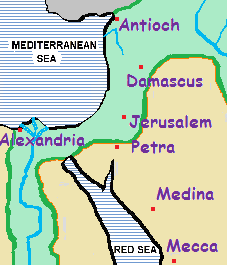Spadina Literary Review — edition 4 page 17
review

Arab springboard
In the Shadow of the Sword
The birth of Islam and the rise of the global Arab empire
by Tom Holland
Doubleday; ISBN 978-0-385-53135-1
reviewed by Clement Peddington
One night in the year 610 CE the angel Gabriel dropped in on an Arab merchant named Mohammed who was meditating in a cave. OK, let's not quarrel over the date: it was 610 AD by the Gregorian calendar and 12 BH (= before hijra) by the Islamic calendar. In any case, Gabriel advised Mohammed that there is only one God and that he, Mohammed, was tasked with communicating that information to his pagan acquaintances.
Up to this point the Arabs had been a divided, polytheistic people trading with, and soldiering for, the Roman and Persian empires. In winning the Arabs over to monotheism, Mohammed made of them a unified force and in short order the Arabs, energized by their new faith, re-inventing themselves as the sword of God's will, fanned out to conquer the Near and Middle East, North Africa, and Spain. The Persian and Roman empires that had endured for one and a half millennia simply gave way before them, as if the Persians and Romans too were overwhelmed by a sense of inevitability.
I opened Tom Holland’s In the Shadow of the Sword with blatant eagerness, supposing from the title that I would at last be able to fill in the gaps in my knowledge about that seventh-century Arab breakout.
Let me note first of all that Holland tries to shift the centre of gravity for the origins of Mohammed himself and Islam itself out of the desert where in our imaginations we often place them and closer instead to the conventional Christian/Jewish "Holy Land", where many Arabs made their living at the time. Holland believes that the Quyreshi, the "tribe" to which Mohammed belonged, was, or had been, a collection of mercenaries in the employ of Rome, or more accurately in the employ of Constantinople which was Rome's successor. Their function had been to guard the empire's eastern boundary at the desert edge from Syria to the Sinai and in so doing a number of sites sacred to the polytheistic Arabs came under their "guardianship".